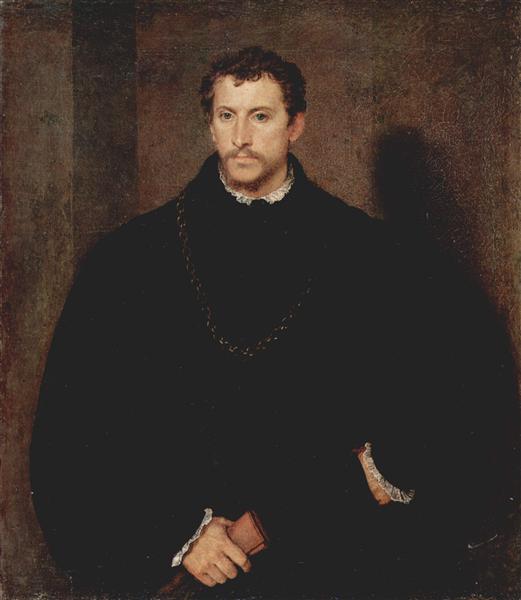Description
The work known as "Portrait of a Young Man (The Young Englishman)", painted by Tiziano Vecellio around 1545, is a masterful example of the Venetian master's virtuosity and his ability to transform the representation of portraiture in his time. This painting is on the threshold between the idealized portrait and the more intimate and psychological representation of the human figure, a characteristic feature of Titian's production and of the Venetian Renaissance.
Looking at the composition of the work, the viewer is immediately drawn to the central figure: a young man with an intense gaze who captures attention with his elegant bearing and rich clothing, characterized by a deep neckline and intricate ornaments that suggest a high social status. Titian uses color to enhance the three-dimensionality of the boy, masterfully applying layers of paint that generate unprecedented luminosity and depth. The contrast between the dark background and the lightness of the figure highlights the presence of the young man, who seems to emerge from the canvas, an effect that is often praised in Titian's work.
The play of light and shadow is fundamental in this work. Through the technique of chiaroscuro, Titian models the young man's features in such a way that they not only highlight his physical beauty, but also evoke a palpable emotional expression. The subject's eyes are of particular interest; his gaze seems to challenge the observer, while also attracting empathy and curiosity. This subtlety in emotional expression and gaze aligns with the Renaissance movement, which sought to show the humanity and individuality of the subject.
As for the color palette, Titian employs rich, saturated hues that are characteristic of his style, including deep blues, reds, and golds that bring the young man's clothing to life. The combination of these colors is not only used for aesthetic purposes, but also to symbolize power and nobility. The application of color appears soft and vibrant, a technique that Titian perfected throughout his career; the subtle nuances in shadows and lights produce an almost ethereal effect, transcending time.
The title of the work, as well as its dating, has aroused the interest of art historians, although the identity of the young man portrayed has remained a mystery. Some theorize that he could be a young English nobleman, highlighting the historical context of the period, but without certainty. The ambiguity of this portrait, together with the secrecy surrounding its subject, invites speculation about his life and his relationship with the artist.
Titian's impact on portraiture is expressed in contemporary and later works, where his influence spreads through generations of painters who aspired to capture the essence of the individual through oil painting. In particular, his ability to imbue portraits with a palpable humanity set a precedent for the way portraiture would be approached in Western art.
In conclusion, “Portrait of a Young Man (The Young Englishman)” is more than just a depiction of an individual; it encapsulates the spirit of an era, the technical mastery of an artist, and the complexity of the human condition. Titian, in his genius, not only managed to capture the image of a young man in the prime of his life, but also created a space for reflection on identity and individuality, leaving a lasting imprint on the field of artistic portraiture. The work reminds us that even in the simplicity of a portrait, infinite depth can reside, an achievement that continues to be admired for its relevance and beauty through the ages.
KUADROS ©, a famous painting on your wall.
Hand-made oil painting reproductions, with the quality of professional artists and the distinctive seal of KUADROS ©.
Painting reproduction service with satisfaction guarantee. If you are not completely satisfied with the replica of your painting, we will refund 100% of your money.

